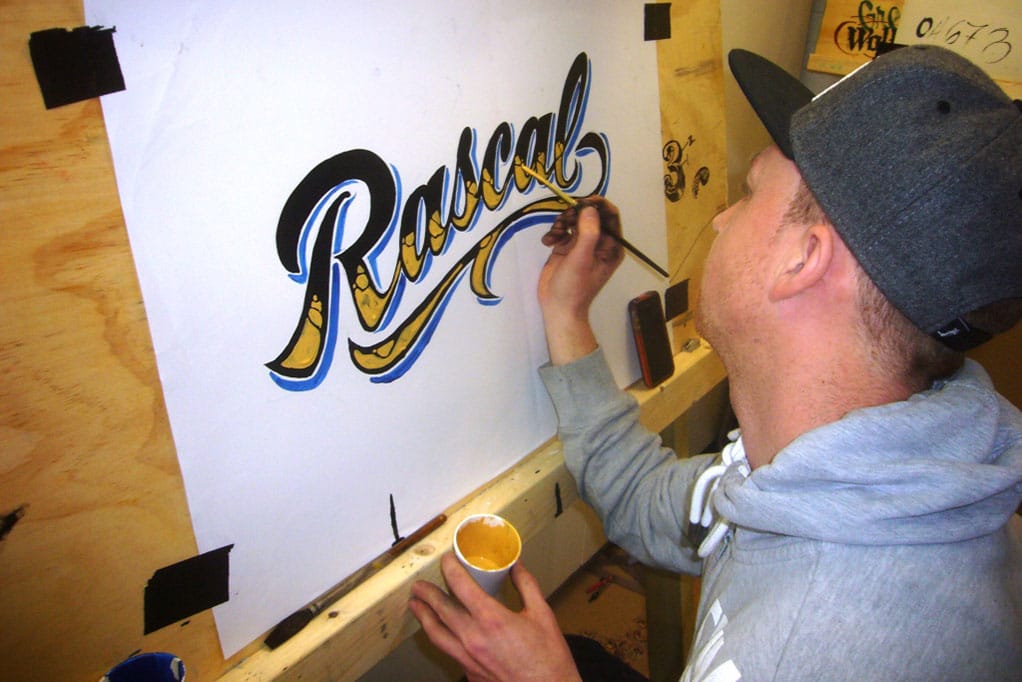
While there are some things that pretty much every designer needs to learn, is hand lettering one of those things?
The answer: it depends.
The importance of hand-lettering
Lately there’s been a huge resurgence of hand-lettering in all kinds of design, not just web design. We see it all over Pinterest, Etsy, stationery, and even restaurants and cafes on walls and menus. Lettering is showing up on invitations and announcements, logos, signage, and even as interior design elements, like chalkboard walls and framed prints. And websites are no different — hand lettered headers, menus, and page elements are particularly popular with bloggers and more artistic endeavors.
Because lettering is getting so much attention both online and off, it’s certainly a skill worth considering.
Why you might consider learning lettering as a designer
The current popularity of lettering means it’s a skill that’s in demand, and skills that are in demand are skills you want to have as a web designer. You become more marketable and you can go after a new market, possibly meaning higher rates for you.
 Photo credit to Ghostsigns.
Photo credit to Ghostsigns.In addition, lettering adds an interesting, new dimension to your creative projects. Rather than every aspect of your design being on-screen, you have the opportunity to incorporate a more tactile form of creativity — something that many artists and creatives benefit from, but aren’t always able to make time for. And a bonus: exercising this more tactile skill expands your overall capacity to be creative–it taps into the interaction between your left and right brain in different ways than your on-screen work will.
Another benefit of picking up a new artistic skill is that it provides a new perspective on design principles, along with a new mechanism for playing with design. You’ll grow not only as a lettering artist, but as a web designer overall.
Lettering goes way beyond web design, too
Another potential benefit of picking up the skill of hand-lettering is that it opens the door for a broader range of freelance work. Because the skill is in such high demand in so many different arenas, you have the opportunity to develop multiple facets of your business — and multiple sources of income — if that’s something you’re looking for.
Here’s a smattering of “other stuff” that lettering could afford you:
- A la carte graphic design (logos, blog headers, posters, business cards, etc.)
- Fonts, which you can design once and sell again and again
- Invitations, either providing the digital files for the purchaser to print, or coordinating printing and shipping of the physical product
- Prints, which can also be designed once and sold multiple times
- Digital files or templates that can be easily customized (such as birth announcements, “first day of school” printables, etc.)
- Labels, product packaging, stickers, etc.
 Photo credit to Laura DePonte.
Photo credit to Laura DePonte.So, in short, if you’re interested in diversifying or tapping into new markets, lettering may be an interesting new direction for you to go.
How to be a web designer without hand lettering
Does the idea of learning a new skill make you want to hurl your keyboard? Is lettering just not something you’re interested in picking up? No problem. There are certainly some things you can do instead — or not.
- Use a lettering font, which would be pre-packaged and maybe even free.
- Outsource the lettering elements of the website to someone else and incorporate those files. You can find these designers the same places you can find other designers — on freelancer sites like Odesk, in your own network or communities of practice, or by your own research.
- Refer projects to another designer who does lettering when the client insists on that element
All in all, having a skill for lettering isn’t an absolute requirement to be a successful web designer. There are benefits to having the skill, especially if it’s right for your market (or the market you want to be in), but there are workarounds if you don’t fully develop it. It’s entirely feasible to spend your entire career without dabbling in any lettering.
What are your thoughts on lettering? Is it a skill you value, or do you think it’s just a fad? Will it be the next skill you learn?







Comments ( 2 )
PatrickPoono
June 12, 2025
http://semaglupharm.com/# Rybelsus for blood sugar control
AaronQuelo
June 6, 2025
mail order pharmacy: Pharm Express 24 - pharmacy rx one order status